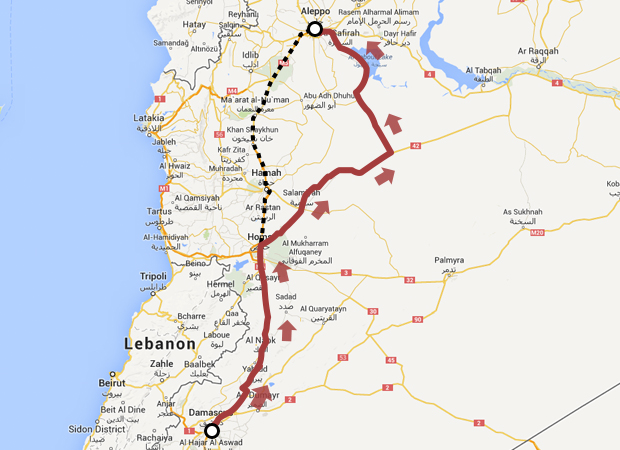Syria struggles to keep war-torn Aleppo running
ALEPPO, Syria -- The drive from Damascus to Aleppo used to take less than four hours. Now it takes a whole, stressful day.
The main highway to Aleppo is a war zone, and so all traffic is funnelled onto small, bumpy back roads - a narrow corridor of safety, guarded by the army but with the armed opposition not too far away on either side.
At last a dusty track leads into the outskirts of Syria's biggest city. City Hall is the tallest building around.
And that - says the local governor - makes it one big target.
Up on the 16th floor, all the glass has been blown-out. Mohammed Akkad may be the boss here, but he can't stand in front of his own windows.
Peeping around the corner, he points out the rebel neighborhoods. The building - he told us - has been hit 200 times by mortars and rockets. Out there, in the divided city, snipers hide and watch.
Roughly 55 percent of the city is in the hands of armed opposition groups, mainly Islamic militants.
Back in his office, we watch security camera video from November that shows a direct mortar hit on City Hall's main entrance.
Rebels routinely use mortars to attack areas of Aleppo controlled by the government as we discovered, chatting with children near an army checkpoint.
One landed a block away; luckily, no one was hurt.
Across the lines, the Syrian military drops barrel bombs - filled with metal shards - on rebel-held areas.
Why a barrel bomb? It's such a primitive, inaccurate weapon.
But Akkad ducked the question. "I can't discuss military decisions," he said.
This war has driven thousands of refugees into the governor's city seeking safety - and adding to the strain on resources.
Later in the day, Akkad - AK47 at his side - gave us a tour of his battered city.
And very quickly he was spotted by some of the desperate, who got a little charity though his car window.
But that's just stopgap help in a city where there's little work.
Akkad showed us an industrial suburb recently in rebel hands - now taken back by the Syrian army - and one carpet factory owner back at his loom.
But this is more heroic gesture than commercial opportunity. There's not much of a market for carpets these days and no easy way to transport them.
Down every street it seems, there's another problem. Garbage is piling up, said Akkad, because rebels have captured the sanitation depot.
An old man ambushed the governor's car: "Please," he begged, "fix our pipes."
Akkad knows the two main pumping stations are in rebel hands, but he promised to try. One more thing on an impossible to-do list as the fighting rages on, day and night.

